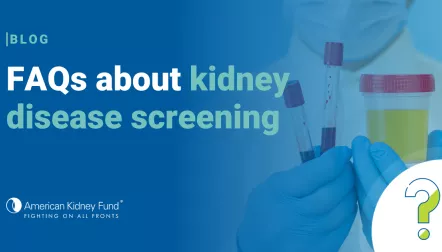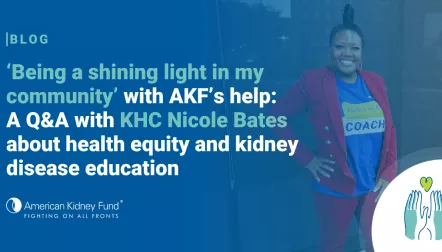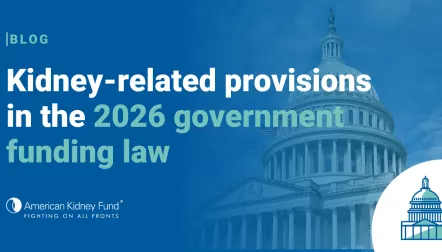
Blog post
COVID-19 myths vs. facts

Have you heard that COVID-19 can be cured with garlic? Or that drinking lots of water will flush the virus from your system? If so, you are not alone. Since the spread of COVID-19, false information about this new virus has been circulating on the internet. Because so little is known about this disease, many people have turned to social media for answers. Unfortunately, a lot of the information out there is not true.
Top 4 COVID-19 myths kidney patients need to know are false:
1. You will know if you or someone else has COVID-19
People who have tested positive for COVID-19 do not always have symptoms you can see. It can take up to 14 days for someone who has been infected to show any symptoms or become sick. Some people's symptoms are mild, while others are more serious. Some people have no symptoms at all. It is important to practice social distancing, even if you think someone seems healthy. And if you think you have symptoms, talk to your health care provider to get tested. That is the only way to know for sure.
2. You need anti-bacterial soap to kill the coronavirus germs
Anti-bacterial soap is not necessary. The fat-like substance in regular soap breaks down the virus, making it inactive. Regular soap is also better than hand sanitizers and other alcohol-based products because less soap is needed to kill the virus and it is gentler on your skin. Just remember to wash your hands for at least 20 seconds.
3. Home remedies can cure COVID-19
We have heard people say that heat, garlic, silver, essential oils and even using a blow dryer to blow hot air up your nose will kill COVID-19. These claims are false. There is currently no cure or vaccine for COVID-19.
4. Stores will run out of food, water and toilet paper
These items have been in short supply across the country due to panic shopping. That means people are buying more than they need to stock up, causing grocery and other stores to sell out. There is no need to panic shop. Even as local governments have implemented stay-at-home orders, people can still leave their house to get essential supplies and medication. If a store near you is out of something you're looking for, it is just temporary. The supply chain has not been drastically affected by COVID-19, and stores are restocking their shelves regularly. These items are just in high demand.
How to protect yourself a against false information:
Check your source and your source's source! Even if you receive information from a trusted friend or relative, make sure their information is coming from well-known, reliable news sources. Some celebrities, news organizations and elected officials have also been guilty of spreading false information.
To make it easier for you, below are some reputable sources for information on coronavirus. If you prefer to get your news through social media, most of these sources also have social media pages that you can follow to get regular updates.
American Kidney Fund
You can find information and resources for people with kidney disease by visiting our special coronavirus webpage. We are updating the page with important information for people with kidney disease and their caregivers as the coronavirus crisis continues to unfold.
Center for Disease Control and Prevention (CDC)
The CDC is the government agency tasked with studying, detecting and responding to new and emerging health threats. They are the resource being used by both health professionals and government officials.
Local and state government websites
It is important to stay updated on how your local government is responding to this health emergency. Check your state's website to see what your state and governor are doing in response to COVID-19. Most state government website addresses are the name of the state followed by .gov. For example, the website for Maryland (where AKF is headquartered) is maryland.gov. You can tell if you have ended up on your state's official website if it ends in .gov. If it does not, it is not an official government website.
211
Dialing 2-1-1 on your phone will give you information about resources and assistance in your area. You can also call 2-1-1 if you have questions about COVID-19.
Your health care provider
If you think you have COVID-19, you should contact your primary health care provider first. They can schedule a telehealth appointment with you, tell you what to do or tell you where to go if they believe you should be tested for COVID-19. Speaking with your primary health care provider first will help prevent some overcrowding at hospitals currently in need of many more beds than they have.
If the situation is an emergency, you should call 9-1-1 or go to your local emergency room.
The information in this post is current as of April 7, 2020. Information about COVID-19 can sometimes change rapidly. For the most up-to-date information, please check our COVID-19 page.





